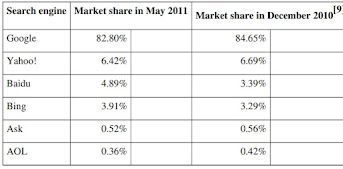Search engine
A web search engine is designed to search for information on the World Wide Web and FTP servers. The search results are generally presented in a list of results often referred to as SERPs, or "search engine results pages". The information may consist of web pages, images, information and other types of files.
Some search engines also mine data available in databases or open directories. Unlike web directories, which are maintained only by human editors, search engines also maintain real-time information by running an algorithm on a web crawler.
How web search engines work
A search engine operates in the following order:
1. Web crawling
2. Indexing
3. Searching
Web search engines work by storing information about many web pages, which they retrieve from the HTML itself. These pages are retrieved by a
1. Web crawler (sometimes also known as a spider) — an automated Web browser which follows every link on the site. Exclusions can be made by the use of robots.txt. The contents of each page are then analyzed to determine how it should be indexed (for example, words are extracted from the titles, headings, or special fields called meta tags).
Data about web pages are stored in an index database for use in later queries. A query can be a single word.
2. The purpose of an index is to allow information to be found as quickly as possible. Some search engines, such as Google, store all or part of the source page (referred to as a cache) as well as information about the web pages,store every word of every page they find. This cached page always holds the actual search text since it is the one that was actually indexed, so it can be very useful when the content of the current page has been updated and the search terms are no longer in it. This problem might be considered to be a mild form of linkrot, and
3. Google's handling of it increases usability by satisfying user expectations that the search terms will be on the returned webpage. This satisfies the principle of least astonishment since the user normally expects the search terms to be on the returned pages. Increased search relevance makes these cached pages very useful, even beyond the fact that they may contain data that may no longer be available elsewhere.
Market share
Google's worldwide market share peaked at 86.3% in April 2010.
Yahoo!, Bing and other search engines are more popular in the US than in Europe.
According to Hitwise, market share in the U.S. for October 2011 was Google 65.38%, Bing-powered (Bing and Yahoo!) 28.62%, and the remaining 66 search engines 6%.
However, an Experian Hitwise report released in August 2011 gave the "success rate" of searches sampled in July. Over 80 percent of Yahoo! and Bing searches resulted in the users visiting a web site, while Google's rate was just under 68 percent.In the People's Republic of China, Baidu held a 61.6% market share for web search in July 2009.
Search engine bias
1. Although search engines are programmed to rank websites based on their popularity and relevancy, empirical studies indicate various political, economic, and social biases in the information they provide.
2. These biases could be a direct result of economic and commercial processes (e.g., companies that advertise with a search engine can become also more popular in its organic search results), and political processes (e.g., the removal of search results in order to comply with local laws).
3. Google Bombing is one example of an attempt to manipulate search results for political,social or commercial reasons.
Search engine results page
A search engine results page (SERP), is the listing of web pages returned by a search engine in response to a keyword query. The results normally include a list of web pages with titles, a link to the page, and a short description showing where the Keywords have matched content within the page. A SERP may refer to a single page of links returned, or to the set of all links returned for a search query.
Query caching
Some search engines cache pages for frequent searches and display the cached pages instead of a live page to increase the performance of the search engine.
Different types of results
SERPs of major search engines like Google, Yahoo!, Bing, may include different types of listings: contextual, algorithmic or organic search listings, as well as sponsored listings, images, maps, definitions, videos or suggested search refinements.
Generation of SERPs
Major search engines like Google, Yahoo! and Bing primarily use content contained within the page and fallback to metadata tags of a web page to generate the content that makes up a search snippet. The html title tag will be used as the title of the snippet while the most relevant or useful contents of the web page (description tag or page copy) will be used for the description. If the web page is not available,information about the page may be used instead.
SERP tracking
Webmasters use search engine optimization (SEO) to increase their website's ranking on a specific keyword's SERP. As a result, webmasters often check SERPs to track their search engine optimization progress. To speed up the tracking process, programmers created automated software to track multiple keywords for multiple websites.







0 Comments